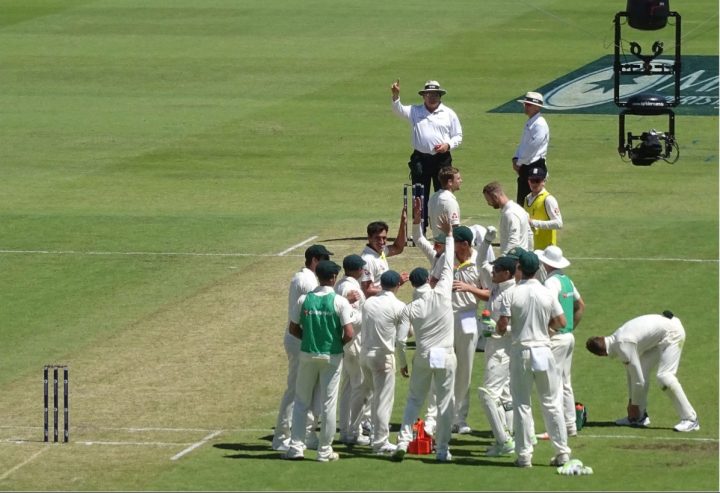We’ve all got mates who dislike cricket (or don’t understand it). I happened to be with one yesterday evening when the fifth test finally got interesting. At one point, I think I was converting him. “This is pretty tense” he said, “I can see why this Pietersen bloke gets so much attention”.
And then, just at the point when he’d moved from a slouched position to the very edge of his seat, Aleem Dar called for his light-meter. The rest, you can probably guess.
“This is exactly why I hate cricket” my mate said. “Bad light?! There’s bloody floodlights on. What an archaic convention. The game would’ve been over in ten minutes”.
He was right. How on earth could I defend the game I love in such circumstances? I tried to explain that the umpires had set a benchmark earlier in the match, and were just following regulations, but there were 25,000 paying spectators inside The Oval and they deserved a satisfactory conclusion.
My friend was baffled because they play under floodlights all the time in ODIs; playing with a red ball and white sight-screens isn’t that different from playing with a white ball and black sight-screens. I tried to explain that a red ball casts a different shadow, and therefore its harder for the fielders to see, but my friend scoffed: “well, why don’t they play with a white ball all the time then?”. “Because …. erm … it’s tradition” I replied. “It’s archaic, more like”. I let him have the final word.
I have to admit I’m one of the few people who actually had sympathy for the umpires yesterday – although I might have taken the players off a bit earlier. Had they called things off when Trott was out, nobody could say for certain that England would’ve won. As it happened, the umpires gave England a little more time to force a win, but ended up looking like they’d mugged the home side.
What’s more, the umpires had to be fair to Australia. Michael Clarke would’ve factored the strong possibility of bad light into the timing of his declaration. My guess is that he thought they wouldn’t play past 7pm, and there would likely be just thirty or thirty-five overs possible. I don’t think he really ever thought he could win the game: his plan was probably just to embarrass England’s top order (again), take a few wickets and gain some momentum before the return series down under. I bet Clarke and Lehmann never thought, even for a second, that England would try to chase the runs.
However, having said all that, we live in an age when T20 cricket is taking over, and Premier League football is, for all its blatant faults, the national obsession. Test cricket has to move with the times, or it will become, in the words of my unsympathetic mate, an anachronism.
Whether we like it or not, sport is an entertainment business, and this is how test cricket should present itself. The ICC needs to do everything in its power to market the game as a tough and absorbing contest that’s worth watching. Forcing rigid regulations onto umpires, which stunt the natural outcome of important matches, shoots the game in the foot.
Yesterday was therefore both a triumph for cricket – thanks to Clarke’s sporting declaration and England’s assertive batting – but also a disaster: having showed what the game is capable of, it then revealed what it currently is. The ICC need to introduce more flexibility and common sense. There’s no point blaming the umpires themselves – they’re just doing their job.
In a way, however, I actually found yesterday quite satisfying in the end. Yes, it would have been nice to win 4-0, but all talk of Australia gaining a psychological edge before Brisbane was dispelled. England now have the advantage (if they ever actually relinquished it).
Those of us who have been imploring England to play more aggressively felt particularly gratified. During the warm-up series against New Zealand, we argued forcefully that Compton should be dropped – not because he is a bad player, but because we needed some positivity at the top of the order. We argued, quite rightly as it turned out, that Australia’s strength was their seam bowling, and their best chance was to put us under pressure immediately.
As it turned out, Root was the wrong choice to open with Cook, because he ended up batting just as negatively as Compton; in effect, England therefore changed nothing. Because our batsmen put Australia’s bowlers under no pressure whatsoever (I lost count of the number of half-trackers and half-volleys our openers either blocked of left alone) Harris and Co soon found a rhythm, safe in the knowledge they wouldn’t be punished when erring in line and length. It’s amazing how much confidence this gives a bowling attack.
What we saw yesterday is that Australia’s much vaunted attack (and they do have some very good bowlers) isn’t anywhere near as frightening when it’s under the pump. Harris, Siddle and Watson are human. They do concede runs when they’re nervous.
I really hope England learn this lesson before Brisbane. We’ve been far too negative in this series, and our caution, and the captain’s obvious anxiety, have spread through the team – and as every psychologist knows, human beings do not perform to their best when they’re anxious.
Yesterday evening was therefore a farce, but it at least had one massive positive: it proved that when England are confident, relaxed and on the offensive, Australia can’t live with them.
James Morgan









Well summed up Morgsie. Brilliant entertainment till 7.30, then a farcical end to the game. Hopefully it will bring about a change in the rules – the players should never go off for bad light if the ground has floodlights. The ICC simply must find a way, otherwise it just gives more ammunition to cricket’s detractors.